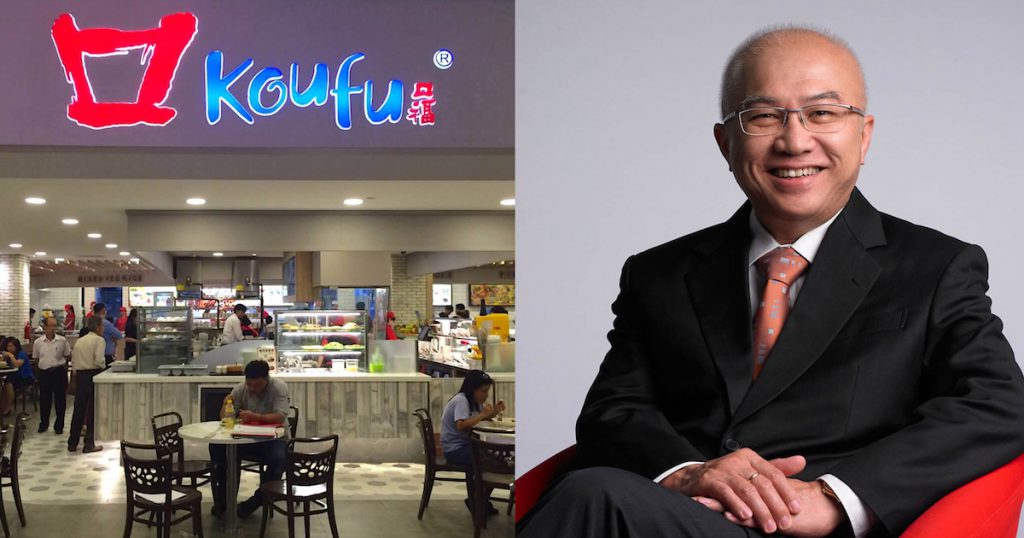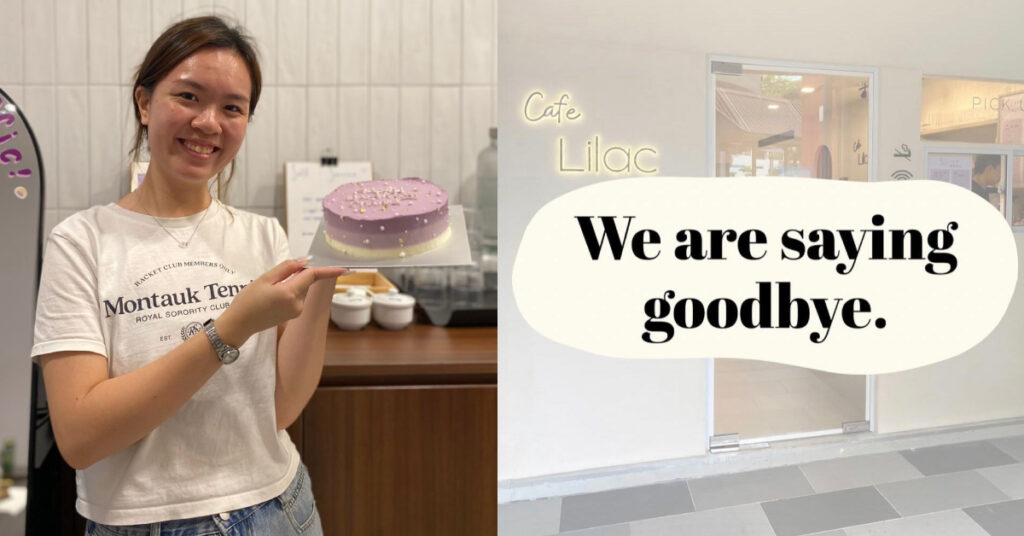Food court operator Koufu recently launched its initial public offering (IPO) for a mainboard listing at $0.63 a share.
It aims to raise net proceeds of $70.5 million through the sale of 51.2 million new shares, 21 million new cornerstone shares and 45.8 million shares currently owned by Koufu founder Pang Lim and wife Ng Hoon Tien.
This means that only $43 million of the IPO proceeds will go to the company.
Upon its debut, Koufu will have a market cap of $349.8 million, which is 13 times its 2017 earnings.
Both husband and wife will still own 78.7 per cent of Koufu after the IPO, or 75.5 per cent if an over-allotment option is exercised in full.
For now, the two have agreed to a six-month lock-up period on their shares.
Pang told The Business Times in Mandarin that their “cash flow has been good and stable, from the first day till now”.
Last year, Koufu generated a net cash flow of $51 million from operations. Net profit was $26.8 million and its revenue was steady at $216.7 million.
In light of this stellar earnings, we have sussed out some of the company’s milestones over the past 16 years:
1. Koufu Founder Worked In F&B Since Age 13

Koufu founder Pang Lim has been working in the F&B industry for 50 years now.
He had dropped out of school at age 13 and started his career early as a dishwasher and as a roadside hawker selling wanton noodles.
In the 1970s, he sold fruits at Sungei Road’s notorious Thieves Market for five years and later ran a ‘nasi’ lemak stall at a coffee shop.
Then in 1990, he opened his own coffee shop together with some family members, which marked the genesis of the Koufu brand.
From there, he progressively went into operating and managing his own coffee shops and food courts.
He only founded Koufu in 2002 with a ten-person team, but the food court landscape in Singapore was already dominated by other major players such as Food Junction and Kopitiam then.
Despite the competition, Koufu today runs a successful chain of over 50 food courts, coffee shops and restaurants across Singapore.
In 2012, Koufu celebrated its 10th anniversary with its first first food court overseas in Sands Cotai, Macau.
Koufu was a 1000-staff strong company then, and had raked in an annual revenue of $152.7 million.
“In just 16 years, Koufu has expanded its business profile from neighbourhood coffee shops to establishing large-scale modern foodcourts in residential as well as commercial shopping malls,” said Pang.
Despite its successes, it has had some failed businesses and have closed two underperforming food courts so far.
2. Owns A Portfolio Of Brands
Since its initial years establishing food courts in heartland shopping malls, Koufu has since grown to include food courts based in shopping malls, commercial buildings and academic institutions.
Koufu has now become one of Singapore’s most established F&B brands with many sub-brands in its stable, but it still remains the flagship brand of Pang’s F&B empire.
Koufu’s stable of F&B outlets includes six coffee shops under the brand name ‘Verinice’, which catered to heartland residents.
And seeing the wide population of Muslims in Singapore who adhere to a halal diet, Pang also introduced ‘Fork & Spoon’ and ‘NeighbourFood’ as halal food courts and coffee shops.
As society progressed, many Singaporeans also grew nostalgic about the “good old days” of the 1960s and 1970s when they used to have their meals in the traditional coffee shops.
Sensing this demand, ‘Xi Duo Fu — Happy Hawkers’ was launched. It attempted to recreate the ambience of an old style coffee shop.
In addition to food courts and coffee shops, Koufu also launched ‘Hungry Jack’, which marks Koufu’s first venture into Western cuisine.
The year 2010 marked a significant milestone for Koufu as it ventured into a whole new market space.

Ever since its inception, Koufu had always served the mass market. But in late 2010, Koufu invested $5 million — its biggest investment to date — to establish an outlet called ‘Rasapura Masters’ in the luxurious integrated resort of Marina Bay Sands.
Pang wanted it to rival the popular Newton Hawker Centre as the “must-go” place for tourists wanting a taste of Singapore’s hawker food culture.
“It is positioned as a milestone for Koufu. Marina Bay Sands is the iconic venue for entertainment in Singapore. So by opening a food court here, it takes the whole Koufu brand to a higher platform.”
Since the opening of ‘Rasapura Masters’, Pang had added a few more upmarket concept concept store food courts into Koufu’s stable, including ‘Gallerie’ in Marina Square shopping mall, ‘The Kitchen’, ‘Gourmet Paradise’ and ‘1983’.
3. A Tech-Savvy ‘Kopitiam’

Earlier this year, Koufu became the first foodcourt in Singapore to fully implement DBS FasTrack-powered mobile app.
The app allows customers to skip the long queues by ordering and paying for their food via the app.
The 63-year-old said that adopting this solution allows the company to lower operating costs, overcome manpower shortage and improve productivity.
Following this digital initiative, Koufu has seen sales increase for the first four outlets in the pilot phase, and a steady increase in app downloads month-on-month.
Pang has also integrated other tech solutions in its business such as a smart tray return robot, a self-ordering kiosk, as well as a kitchen automation.
He advises other business owners to always keep the customer in mind when looking to adopt new technology.
“We like to use technology that is user-friendly and convenient and yet enhances the dining experience for our valued customers,” he said.
Koufu’s chief development officer David Yang also said that although they are in a very traditional industry, it is imperative for them to evolve with the times.
“We need to … change to make it more fashionable [and] attractive for the younger generation to want to join the industry. If we do not innovate, we will find it harder, as years go by, to attract talent.”
4. S’pore’s First Food Court To Ditch Plastic Straws

According to the National Environment Agency’s 2017 statistics, plastics constitute the highest amount of disposed waste at 763,400 tonnes and they have the second lowest recycling rate at 6 per cent in Singapore.
As such, many companies in Singapore like KFC and Deliveroo have ditched plastic straws in an effort to reduce plastic waste and safeguard the environment.
In April 2018, Koufu at the Singapore Management University (SMU) have jumped on the bandwagon to be Singapore’s first food court to implement this initiative.
Straws are now given to customers only upon request and depending on the response, Koufu hopes that it will be able to expand this initiative to its other outlets.
In addition to its #SayNoToPlasticStraws movement, the food court will also be using biodegradable takeaway packaging and reusable utensils to encourage the public to reduce usage of disposable items.
To Invest $5 Million To Expand Further
Due to fewer new mall openings in Singapore, Koufu is exploring the overseas market to expand its F&B retail businesses.
Out of its $43 million IPO proceeds, Koufu plans to use $30 million of the IPO proceeds to build an integrated facility that is expected to be completed in the second half of 2020.
Another $8 million will be used to refurbish and renovate its F&B outlets, and the remaining $5 million will fund other expansion plans.
Particularly, it intends to complete the acquisition of a major stake in a business-to-business bakery in the fourth quarter this year, to expand its bakery, confectionery and hot kitchen food production business.
There are also plans in the pipeline to open a Koufu food court at Sengkang General and Community Hospital, and a Supertea F&B kiosk at Marina Bay Sands in July.
Featured Image Credit: Reuters/ Koufu
Also Read: From Kopi Boy To Boss Of Over 80 Outlets – This Is How Lim Bee Huat Built The Kopitiam Empire










